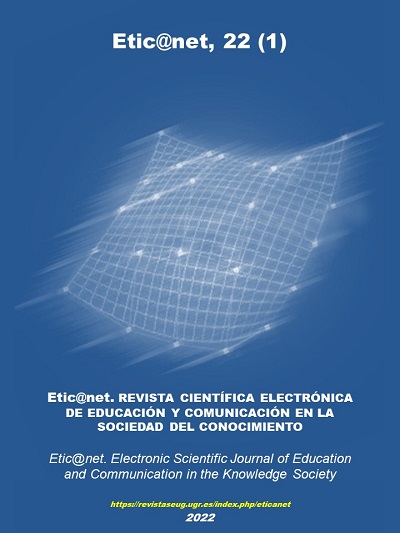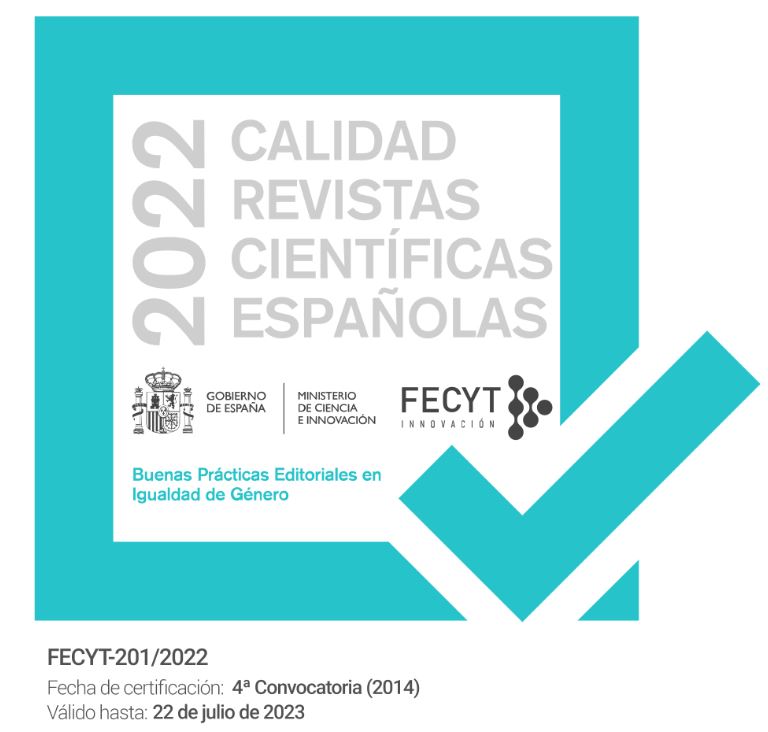Eureka-challenge: a Service-Learning experience to learn the scientific method among different agents of the educational process
DOI:
https://doi.org/10.30827/eticanet.v22i1.24007Keywords:
Service-learning, scientific method, ICT, cooperative learningAbstract
This experience describes a Service-Learning project dealing with proposing a challenge to different schools (preschool and primary schools) in which learners should record themselves doing an experiment following the scientific method. After that, schools should upload that video to a website in which all participants could see the different experiments. This methodological proposal is designed and carried out by preservice teachers who are at university and who are responsible for coordinating the whole activity.
In this sense, a repository of experiments would be created to be consulted, thus contributing, not only to the learning of participant classrooms, but also to any other students who are studying online.
After carrying out the activity, a survey was sent to the participating teachers from the different schools so that they could evaluate the activity and propose any improvements. Similarly, a certificate of participation was drawn up for all the agents involved.
Downloads
References
Batlle, R. (2011). ¿De qué hablamos cuando hablamos de aprendizaje-servicio? Revista Crítica, 972, 49- 56.
Batlle, R. (2013). El Aprendizaje-Servicio en España: el contagio de una revolución pedagógica necesaria. Madrid: PPC.
Cantó Domenech, J. (2018). Una experiencia de aprendizaje y servicio en la formación inicial en ciencias de maestros y maestras de educación infantil. En Martínez Losada, C. y García Barros, S. (Editoras). 28º Encuentros de Didáctica de las Ciencias Experimentales. Iluminando el cambio climático. A Coruña: Universidade da Coruña, Servizo de Publicacións. https://doi.org/10.17979/spudc.9788497496896
De la Blanca de la Paz, S. y Hidalgo Navarrete, J. (2021). Una investigación al servicio de la comunidad. APS, una metodología para el desarrollo de competencias y valores de compromiso. En Buzón García, O., Romero-García, C. y Verdú Vázquez, A. (Coords). Innovaciones metodológicas con TIC en educación. Madrid: Dykinson.
De la Cerda, M. (2020). El Aprendizaje-Servicio: la investigación como servicio a la comunidad. En Broglio, E. y De la Cerda, M. (Coords). Ciencia ciudadana y aprendizaje y servicio. Barcelona: Asociación Centre Promotor d’Aprenentatge Servei. https://doi.org/10.5281/zenodo.3924243
Furco A. y Billig, S. H. (2002). Service-learning: The essence of the pedagogy. Greenwich CT: Information Age Publishing.
Gao, W., y Mager, G. (2011). Enhancing pre-service teachers’ sense of efficacy and attitudes toward school diversity through preparation: A case of one U.S. inclusive teacher education program. International Journal of Special Education, 26(2), 1-16.
Liesa Orús, M. (2021). Prólogo. En Lisa Orús, M. (Coord.). Educación comprometida con los Objetivos de Desarrollo Sostenible: calidad, equidad educativa y metodología aprendizaje - servicio. Huesca: Facultad de Ciencias Humanas y de la Educación. Universidad de Zaragoza.
Loreman, T., Sharma, U., y Forlin, C. (2013). Do Pre-service Teachers Feel Ready to Teach in Inclusive Classrooms? A Four Country Study of Teaching Self-efficacy. Australian Journal of Teacher Education, 38(1). https://doi.org/10.14221/ajte.2013v38n1.10 Mergler, A., Carrington, S., Kimber, M., & Bland, D. (2016). Inclusive Values: Exploring
Marín Juarros, V., Moreno-García, J., y Negre Bennasar, F. (2012). Modelos educativos para la gestión de la información en educación superior: una experiencia de curación de contenidos como estrategia metodológica en el aula universitaria. Edutec. Revista Electrónica De Tecnología Educativa, 42, 1-22. https://doi.org/10.21556/edutec.2012.42.1
Martín, X., Rubio, L., Batlle, R. y Puig, J.M (2010). ¿Qué es el aprendizaje servicio?. En Martín, X. y Rubio, L. (Coord). Prácticas de ciudadanía. Diez experiencias de aprendizaje servicio. Madrid: Ediciones Octaedro.
Ortíz de Santos, R., Santamaría-Cárdaba, N. y López Luengo, M. A. (2021). Evaluación de una propuesta de educación ambiental entre la Universidad y una organización conservacionista. !Ayudemos a los aguiluchos cenizos! Didáctica de las Ciencias Experimentales y Sociales, 40, 117-132. https://doi.org/10.7203/DCES.40.16074
Puig, J. M.ª (Coord.). (2010). Entre todos. Compartir la educación para la ciudadanía. Barcelona: Horsori.
Puig, J.M. (coord.) (2007). Aprendizaje servicio: educar para la ciudadanía. Barcelona: Octaedro.
Puig, J.M. y Palos, J. (2006). Rasgos pedagógicos del aprendizaje-servicio. Cuadernos de Pedagogía, 357, 60-63.
Razquin, B. (2017). El Aprendizaje-Servicio como respuesta a la responsabilidad social de la Universidad. AmbioCiencias, 15, 63-69.
Tapia, N. (2001). La solidaridad como pedagogía. Buenos Aires: Ciudad Nueva.
Sharma, U., Loreman, T. y Forlin, C. (2012). Measuring teacher efficacy to implement inclusive practices: An international validation. Journal of Research in Special Educational Needs, 12(1), 12–21. https://doi.org/10.1111/j.1471-3802.2011.01200.x
Stewart, T., Allen, K.W., y Bai, H. (2011). The effects of service-learning participation on pre-internship educators’ teachers’ sense of efficacy. Alberta Journal of Educational Research, 57(3), 298-316.
Woodcock, S., Hemmings, B., & Kay, R. (2012). Does study of an inclusive education subject influence pre-service teachers' concerns and self-efficacy about inclusion? Australian Journal of Teacher Education, 37(6), https://doi.org/10.14221/ajte.2012v37n6.5
Published
Issue
Section
License
The authors who publish in this journal agree to the following terms: The authors retain the copyright and grant the journal the right to be the first publication of the work as well as licensed under a Creative Commons Attribution License that allows others to share the work with an acknowledgment of the authorship of the work and the initial publication in this magazine. Authors are allowed and encouraged to disseminate their work electronically (for example, in institutional repositories or on their own website) before and during the submission process, as it may lead to productive exchanges as well as further citation. Earliest and greatest of published works (See The Effect of Open Access).













